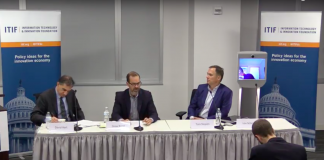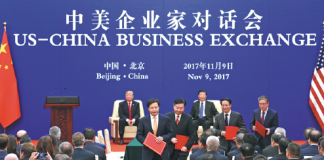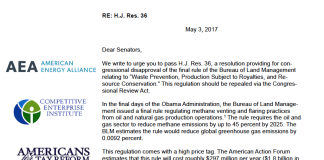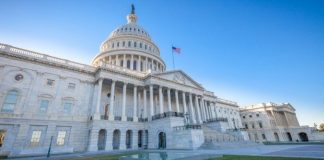Economic Policy Salon “Modernizing our Energy Infrastructure”
On February 6th, the ACCF hosted the Honorable Dan Brouillette, Deputy Secretary of Energy for the U.S. Department of Energy for an ACCF Economic Policy...
ACCF Center for Policy Research Applauds Bill Gates Announcement on Expansion...
Statement from Drew Bond, ACCF Senior Fellow & Director of Energy Innovation Programs:
"Bill Gates has demonstrated his leadership and forward thinking in expanding the Breakthrough Energy...
Economic Policy Evening with EPA Administrator Scott Pruitt
On December 6, the ACCF hosted the Honorable Scott Pruitt, Administrator of the Environmental Protection Agency at a special Economic Policy Evening for a discussion on EPA's Agenda Today.
ACCF Senior Fellow Drew Bond on ITIF Clean Energy Panel
Drew Bond participated as a panelist at an ITIF discussion of the Advanced Research Projects Agency – Energy (ARPA-E) and its versatile role in clean energy innovation.
Chinese, Alaskan officials sign LNG project development agreement
Published in Oil & Gas Journal
If the gas pipeline is built and the LNG export infrastructure is put in place, it will be a much needed boost for the slumping Alaskan economy
If the gas pipeline is built and the LNG export infrastructure is put in place, it will be a much needed boost for the slumping Alaskan economy
Congress must come to terms on climate change regulation
What has become abundantly clear is that there is widespread disagreement in Congress, the Supreme Court and now two successive administrations in how to address climate change. Given its global impact, these types of monumental decisions need to be made in the halls of Congress as the elected body to identify, discuss and act as representatives of the people.
E&E News on ACCF Special Report
Published in E&E News
The analysis from the American Council for Capital Formation says tax changes could improve the investment climate in three ways, including through enactment of lower tax rates and elimination of interest deductions.
The analysis from the American Council for Capital Formation says tax changes could improve the investment climate in three ways, including through enactment of lower tax rates and elimination of interest deductions.
GUEST COMMENTARY: Amid low crude prices, tax policy matters more than...
Even amid low crude oil prices and a difficult market, the oil industry employs 10 million Americans and serves as a pivotal engine for economic growth. We simply can’t afford to let bad policy — in Alaska or anywhere else — add to the challenges faced by one of our nation’s most important job creators.
Economic Policy Salon “Accelerating Energy Innovation”
On September 26th, the ACCF proudly hosted Energy Secretary Rick Perry for a vibrant discussion at an Economic Policy Salon, "Accelerating Energy Innovation."
Ignoring free market principles will cost US solar jobs
Published in The Hill
As advocates of market-based polices, we believe that the solar industry works best when market forces are left to decide which companies flourish and which do not.
As advocates of market-based polices, we believe that the solar industry works best when market forces are left to decide which companies flourish and which do not.
Tax reform can level the playing field in the energy market
Published in Washington Examiner
In the days, weeks and months ahead, policymakers should maintain their focus on permanent, comprehensive tax reform and remain committed to ensuring that no sectors of the economy are singled out for unfair treatment.
In the days, weeks and months ahead, policymakers should maintain their focus on permanent, comprehensive tax reform and remain committed to ensuring that no sectors of the economy are singled out for unfair treatment.
Op-Ed: No Easy Options For Perry On Nuclear Infrastructure
Published in Forbes
Mr. Perry must figure out how to sustain federal investment for key defense infrastructure that consumes nearly half of his department’s budget while also defending the White House’s proposed cuts to traditionally popular research and development programs. One issue Mr. Perry should consider promptly is the fact that the United States no longer has any domestic uranium enrichment capability. This is a gaping hole in the defense supply chain.
Mr. Perry must figure out how to sustain federal investment for key defense infrastructure that consumes nearly half of his department’s budget while also defending the White House’s proposed cuts to traditionally popular research and development programs. One issue Mr. Perry should consider promptly is the fact that the United States no longer has any domestic uranium enrichment capability. This is a gaping hole in the defense supply chain.
Direction of Energy Policy in the 115th Congress
The American Council for Capital Formation Center for Policy Research and the ClearPath Foundation hosted a May 17th forum “Direction of Energy Policy in the 115th Congress."
ACCF Joins Coalition Urging Senate Action to Repeal BLM Methane Rule
The American Council for Capital Formation (ACCF) today joined a coalition of 10 other pro-economic growth organizations in calling on the U.S. Senate to use the Congressional Review Act to repeal the Bureau of Land Management’s (BLM) methane regulation.
The Senate’s ability to use the CRA to nullify the methane rule expires on May 11.
BLM’s methane and waste prevention rule requires oil and natural gas producers on federal lands to reduce methane emissions by up to 45 percent by 2025. The rule is just one of dozens of costly regulations pushed through in the final days of the Obama administration.
The rule is expected to cost producers up to $297 million per year to comply, while BLM estimates it would reduce global greenhouse gas emissions by only 0.0092 percent.
Congress Members Urge Trump to Re-Work Paris Agreement
Published on FoxBusiness.com
The group (of Republican congressmen) adds that a recent report by the American Council for Capital Formation, for example, “found achieving this pledge would reduce our gross domestic product by $250 billion by 2025 and reduce economy-wide employment by 2.7 million jobs.”
The group (of Republican congressmen) adds that a recent report by the American Council for Capital Formation, for example, “found achieving this pledge would reduce our gross domestic product by $250 billion by 2025 and reduce economy-wide employment by 2.7 million jobs.”
FERC Quorum Critical to Advancing Trump’s Infrastructure Agenda
Published in Real Clear Energy
The president should take a broader approach and select candidates who understand the importance of ensuring the country has energy that is above all reliable and affordable. And he should do so soon.
The president should take a broader approach and select candidates who understand the importance of ensuring the country has energy that is above all reliable and affordable. And he should do so soon.

















